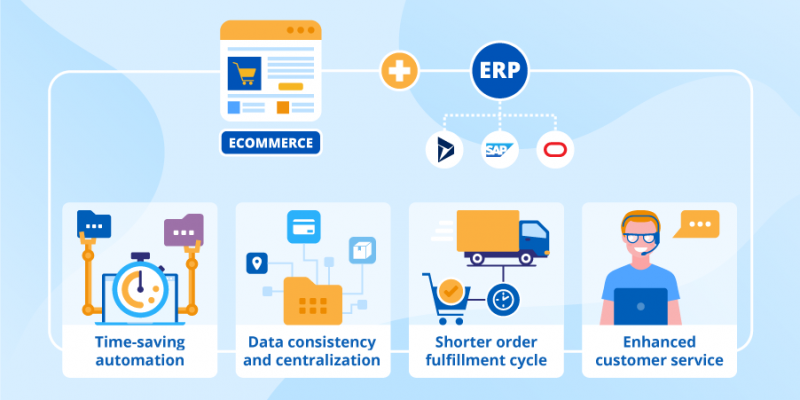The world of e-commerce is dynamic and highly competitive, and businesses are constantly seeking ways to streamline operations and boost sales. In this pursuit, advanced enterprise resource planning (ERP) solutions have emerged as powerful tools for enhancing e-commerce efficiency and driving revenue growth. In this article, we will explore how ERP systems can revolutionize e-commerce operations and lead to increased sales and customer satisfaction.
Understanding advanced ERP solutions:
Advanced ERP solutions are comprehensive software platforms that integrate and streamline various business processes, including finance, inventory management, order processing, customer relationship management (CRM), and more. These systems offer real-time data analysis and reporting capabilities, enabling businesses to make informed decisions and optimize their operations.
The role of ERP in e-commerce:
- Unified data management: ERP systems serve as a centralized hub for all e-commerce data, including customer information, product details, inventory levels, and sales data. This unified data management simplifies access to critical information, reducing data silos and improving decision-making.
- Inventory management: effective inventory managementis crucial for e-commerce success. ERP solutions provide real-time visibility into inventory levels, allowing businesses to track product availability accurately and avoid stockouts or overstocking. This ensures that products are always available to meet customer demand, leading to increased sales and customer satisfaction.
- Efficient order processing: ERP systems automate order processing workflows, from order placement to shipment and delivery tracking. Automation reduces manual errors, speeds up order fulfillment, and enhances the overall customer experience, which can lead to higher sales and customer retention.
- Personalized customer experiences: ERP solutions integrate with CRM functionalities, allowing businesses to gather and analyze customer data. This data-driven approach enables e-commerce companies to personalize marketing efforts, recommend products, and tailor promotions to individual customer preferences, ultimately increasing conversion rates and sales.
- Multi-channel management: e-commerce businesses often operate across multiple sales channels, such as their website, online marketplaces, and brick-and-mortar stores. Advanced ERP systems facilitate seamless management of these channels, ensuring consistent product information, pricing, and inventory levels across all touchpoints.
- Optimized pricing strategies: ERP solutions enable dynamic pricing strategies based on factors like demand, competitor pricing, and inventory levels. Businesses can adjust prices in real-time to maximize profitability and competitiveness, leading to increased sales.
- Streamlined financial management: efficient financial management is essential for e-commerce businesses. ERP systems automate financial processes, including invoicing, payments, and financial reporting, reducing the risk of errors and ensuring accurate financial records.
- Data analytics and reporting: ERP solutions provide powerful data analytics and reporting tools, allowing businesses to gain insights into their operations and customer behavior. These insights can inform marketing strategies, product offerings, and overall business decisions, contributing to revenue growth.
Challenges and considerations:
While ERP systems offer significant benefits, businesses must also address certain challenges when implementing them:
- Cost: implementing an advanced ERP system can be a significant investment, including software licensing, customization, and ongoing maintenance costs.
- Integration: ensuring seamless integration with existing e-commerce platforms and other software solutions can be complex and require technical expertise.
- Change management: employees may need training and support to adapt to new ERP systems and processes.
- Data security: protecting sensitive customer and business data is critical, and businesses must implement robust security measures to mitigate cybersecurity risks.
In conclusion, advanced ERP solutions play a pivotal role in optimizing e-commerce operations and driving sales growth. These systems enable unified data management, efficient inventory control, streamlined order processing, personalized customer experiences, and data-driven decision-making. While challenges exist, the benefits of ERP in e-commerce are clear: increased efficiency, higher sales, and improved customer satisfaction, positioning businesses for long-term success in the competitive e-commerce landscape.












Comments